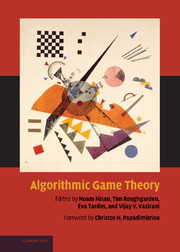Book contents
- Frontmatter
- Contents
- Foreword
- Preface
- Contributors
- I Computing in Games
- II Algorithmic Mechanism Design
- III Quantifying the Inefficiency of Equilibria
- IV Additional Topics
- 22 Incentives and Pricing in Communications Networks
- 23 Incentives in Peer-to-Peer Systems
- 24 Cascading Behavior in Networks: Algorithmic and Economic Issues
- 25 Incentives and Information Security
- 26 Computational Aspects of Prediction Markets
- 27 Manipulation-Resistant Reputation Systems
- 28 Sponsored Search Auctions
- 29 Computational Evolutionary Game Theory
- Index
26 - Computational Aspects of Prediction Markets
from IV - Additional Topics
Published online by Cambridge University Press: 31 January 2011
- Frontmatter
- Contents
- Foreword
- Preface
- Contributors
- I Computing in Games
- II Algorithmic Mechanism Design
- III Quantifying the Inefficiency of Equilibria
- IV Additional Topics
- 22 Incentives and Pricing in Communications Networks
- 23 Incentives in Peer-to-Peer Systems
- 24 Cascading Behavior in Networks: Algorithmic and Economic Issues
- 25 Incentives and Information Security
- 26 Computational Aspects of Prediction Markets
- 27 Manipulation-Resistant Reputation Systems
- 28 Sponsored Search Auctions
- 29 Computational Evolutionary Game Theory
- Index
Summary
Abstract
Prediction markets (also known as information markets) are markets established to aggregate knowledge and opinions about the likelihood of future events. This chapter is intended to give an overview of the current research on computational aspects of these markets. We begin with a brief survey of prediction market research, and then give a more detailed description of models and results in three areas: the computational complexity of operating markets for combinatorial events; the design of automated market makers; and the analysis of the computational power and speed of a market as an aggregation tool. We conclude with a discussion of open problems and directions for future research.
Introduction: What Is a Prediction Market?
Consider the following mechanism design problem called the information aggregation problem. Suppose that an individual (“the aggregator”) would like to obtain a prediction about an uncertain variable, say the global average temperature in 2020. A number of individuals (“the informants”) each hold different and nonindependent sets of information bearing on the outcome of the variable. The goal is to design a mechanism that extracts the relevant information from the informants, aggregates the information appropriately, and provides a collective prediction or forecast. The forecast should ideally be equivalent to the omniscient forecast that has direct access to all the information available to all informants.
Information
- Type
- Chapter
- Information
- Algorithmic Game Theory , pp. 651 - 676Publisher: Cambridge University PressPrint publication year: 2007
Accessibility standard: Unknown
Why this information is here
This section outlines the accessibility features of this content - including support for screen readers, full keyboard navigation and high-contrast display options. This may not be relevant for you.Accessibility Information
- 27
- Cited by
